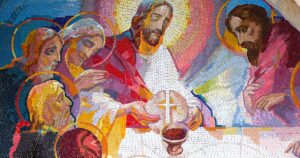Lutheran worship, when true to Lutheran faith, takes the shape or form of a W, so to speak.
The W begins above with God who comes down to us — \ — offering gifts in Word and Sacrament. When repentance receives these gifts with contrition and faith, faith believing the Gospel responds according to the Word. The direction of this response is upward — / — to God, as for example when the liturgy bids us, “Lift up your hearts. We lift them up unto the Lord.”
This action happens repeatedly in three major waves and in many smaller waves. The first wave is the Invocation with Confession and Absolution. The second wave is the Service of the Word. The third wave is the Service of the Sacrament. There are smaller waves within each of these three Services.
This harmonizes with the Lutheran idea of worship expressed, for just one example, in the Apology of the Augsburg Confession, Article IV, Justification, Paragraph 49, which says:
“49 And the difference between this faith and the righteousness of the Law can be easily discerned. Faith is the latreiva [divine service], which receives the benefits offered by God; the righteousness of the Law is the latreiva [divine service] which offers to God our merits. By faith God wishes to be worshiped in this way, that we receive from Him those things which He promises and offers.”
Significantly this explanation of the difference between two kinds of divine service, two different latreiva, two different liturgies, two different ideas of worship is not in an article about ceremonies, nor even an article about the Mass, but in the chief article on justification. Not only so, but it is under the heading, “What Is Justifying Faith?” Here the confessors say,
- By faith
- God wishes
- To be worshiped in this way
- That we receive from him those things which He promises and offers
This tells us that there is no worship without faith.
It tells us what faith is.
It tells us God has his wishes about how He wants to be worshiped.
It tells us that God wants to be worshiped by us receiving from him those things which He promises and offers.
A promise or an offer is a word, and the promise and offer are made in the Word of the Gospel.
So, worship commences in God. Worship proceeds from God in his Word. In the divine service, God speaks his Word. The initiative and action are on God’s part. The direction is from God to us. So far, there is no action, no service by us. Then faith, which also is not something we do, but a gift God gives us by his Word and Sacraments, receives. The “action” of faith is to receive. But it is not faith to receive a self-defined, man-designated gift, but “those things which He promises and offers.”
To be sure, the Word, the Sacraments, and the gift of faith call forth and evoke confession, thanksgiving, and praise. The direction here is from us to God, but only after and in response to the direction from God to us, and only about those things which He promises and offers.
The opposite form or shape of worship is an M. In this form, action begins in the direction from us to God — / —. This is a work under the Law. It is us offering something to God. We may say we are doing this believing, but that is not what the confessions say faith is. It is not what “God wishes.” It is not God “worshiped in this way.” It not to “receive from him those things which He promise and offers.” It is an attempt to evoke from God a response in our direction — \ — because of our service to him — / —.
Some say, “worship preferences can become an idol.” There is a sense regarding “preferences” where that could be true.
But if in “preferences” the difference is whether worship begins with us offering service to God or begins with the God-given gift of faith receiving from God by his Word and Sacraments those things that He promises and offers, that is not a mere “preference.” That, as the Apology confesses, is the difference between God serving us and us serving God. That is the difference between Gospel and Law.
When the design of a ceremony becomes predominately about us rendering to God, well yes, now there is an idolatry problem, and the idol is self. The ceremony is enacting, conveying, embodying, or communicating the notion that we are or have something to offer to God that will please him. But we do not. We cannot please God by attempting to give to him. God is pleased by faith that receives what He gives to us.
For worship to be the divine service of faith, the ceremony must be predominated by what God promises and offers, and how he delivers his promises to us, namely, Word and Sacraments. “Without faith, it is impossible to please God.” (Hebrews 11:6)
Do you want to please God? Then receive in faith the gifts that God chooses to give you by the means God chooses to deliver them, his Word and Sacraments.





Excellent